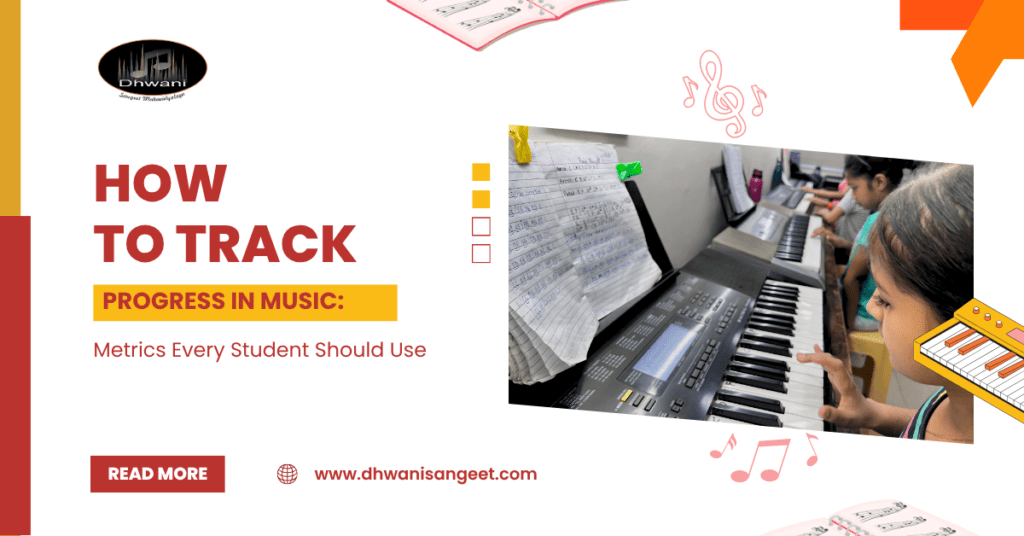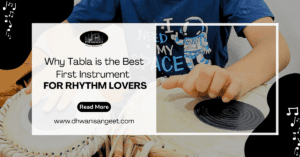
Introduction
Learning music is a beautiful journey. It is not just about mastering an instrument or hitting the right notes — it is about growing every day as a performer and as an artist. Whether you are learning Vocal, Violin, Guitar, Keyboard, Drum, Tabla, Harmonium, Congo, Dholak, Western Dance, Kathak Dance, or Fine Arts, tracking your progress is essential to see how far you’ve come and where you can improve.
At Dhwani Sangeet Mahavidyalaya, one of the best music academies in Gurgaon, students are encouraged to measure their progress with proper techniques and self-evaluation methods. This helps them stay motivated and consistent in their practice routine.
This blog will guide you through how to track progress in music, the metrics every student should use, and how a music academy in Gurgaon like Dhwani Sangeet Mahavidyalaya supports your journey — both online and offline.
Why Tracking Progress in Music Is Important
Many students often ask, “How do I know if I am improving?” The answer lies in tracking your progress regularly.
1. It Keeps You Motivated
When you see measurable progress — whether it’s playing a piece faster, singing with better pitch, or dancing with more expression — you feel motivated to keep going.
2. It Helps Identify Weak Areas
Tracking your music journey highlights areas where you need improvement — like rhythm, timing, or expression.
3. It Builds Confidence
As you see growth over time, your self-confidence naturally increases. You begin to perform more comfortably in front of others.
4. It Creates a Clear Learning Path
Instead of random practice, tracking helps you move step-by-step — from beginner to intermediate and then to the advanced level.
Key Metrics to Track Your Progress in Music
Let’s explore the most effective ways and metrics to measure your musical progress, whether you’re learning vocals, instruments, or dance.
1. Consistency in Practice
The most important metric in music learning is practice consistency. It’s not how long you practice once in a while — it’s how regularly you do it.
At Dhwani Sangeet Mahavidyalaya, students are guided to maintain daily practice logs. For example:
- Vocal students track their voice exercises and breathing drills.
- Guitar or violin students note scales, chords, and new songs learned.
- Tabla, Congo, or Dholak learners record new taals and rhythm patterns.
- Dance students track steps, coordination, and expression sessions.
Tip: Maintain a “Practice Diary” or use a simple calendar to mark your daily progress.
2. Mastery of Basic Techniques
Before moving to advanced lessons, make sure your fundamental techniques are strong. This can be measured through:
- Clarity of notes (for instrumentalists)
- Control over breath and pitch (for vocalists)
- Posture and movement (for dancers)
- Brush control or sketch accuracy (for fine arts students)
For example, a keyboard student should be able to play basic scales fluently before learning complex melodies. Similarly, a Kathak dance learner must master tatkaar (footwork) before performing advanced tukdas.
3. Repertoire Growth
Track the number of songs, compositions, or dance items you have learned. This is called repertoire growth — the expanding list of what you can perform.
For example:
- Vocal students may list classical ragas or light classical pieces.
- Guitar students may count the songs or scales mastered.
- Tabla or Drum learners can note the taals or beats they can play confidently.
- Kathak dancers can list tukdas, parans, or abhinaya items they’ve learned.
A growing repertoire means you’re becoming a more versatile and confident artist.
4. Tempo and Rhythm Accuracy
For instrumentalists and vocalists, rhythm (laya) is everything. You can measure your progress by:
- Using a metronome to check timing.
- Practicing with taal software or tabla tracks.
- Recording and comparing your tempo over time.
Students learning Tabla, Congo, Dholak, Drums, or Kathak Dance especially benefit from rhythm tracking because it builds precision — a skill every performer needs.
5. Stage Confidence and Expression
Music is meant to be shared. Participating in stage performances — like the Annual Day Celebrations in Gurgaon organized by Dhwani Sangeet Mahavidyalaya — helps measure how confidently you perform before an audience.
Track your progress by asking:
- Do I feel more comfortable on stage now?
- Can I perform with expression and grace?
- How well do I connect with the audience?
These emotional and expressive skills are key to your artistic growth.
6. Teacher Feedback and Self-Assessment
At Dhwani, regular teacher assessments help students understand where they stand. But self-assessment is equally important.
Try this:
- Record your singing or instrument practice every week.
- Watch your dance performance videos after each session.
- Listen or view critically — not to judge, but to learn.
Over time, you’ll clearly hear and see the difference in your performance quality.
7. Theory Knowledge and Application
Music is not only about playing — it’s about understanding.
Track your progress in music theory:
- Do you know how to read notations?
- Can you identify ragas or rhythms?
- Can you write or compose basic pieces?
Students learning Hindustani Classical Vocal, Keyboard, Guitar, Tabla, and Harmonium benefit immensely from theory understanding, as it helps them apply technical knowledge in real performances.
8. Creativity and Improvisation
A true artist goes beyond practice — they experiment and create. Measure your creativity by:
- Trying new songs or dance styles.
- Creating your own short compositions.
- Improvising on stage or during practice.
For example, a guitar student can try adding personal touches to a melody, or a Fine Arts learner can develop their own style of painting.
9. Peer and Group Learning
At a reputed music school in Gurgaon like Dhwani Sangeet Mahavidyalaya, students often learn in group classes. This helps you compare progress positively and get inspired by others’ achievements.
You can track progress by:
- Observing how you perform in group recitals.
- Collaborating in duets or ensembles.
- Learning from feedback during joint sessions.
10. Performance Recordings
One of the most powerful ways to see growth is to record your performances regularly — whether it’s a song, a dance routine, or a fine arts creation.
When you watch or listen to older recordings, you’ll easily notice:
- Improvement in pitch, timing, and coordination.
- Better body control in dance.
- More confidence and stage presence.
These recordings become your personal progress portfolio.
How Dhwani Sangeet Mahavidyalaya Helps Track Student Progress
As one of the best music schools in Gurgaon, Dhwani Sangeet Mahavidyalaya follows a well-structured and personalized approach to learning and evaluation.
Here’s how Dhwani supports your journey:
1. Regular Assessments and Feedback
Students receive monthly performance reviews and constructive guidance from experienced teachers in Vocal, Instrumental, and Dance departments.
2. Stage Exposure through Events
Annual events like Dhwani Kala Mahotsava and Annual Day Celebrations in Gurgaon give students a real stage to showcase progress and confidence.
3. Online and Offline Learning Options
Students can choose online music classes or offline sessions — ideal for all age groups and skill levels.
4. Personalized Curriculum
Each student’s progress is tracked individually, ensuring balanced growth in technique, theory, and creativity.
5. Motivation Through Certification and Competitions
Certificates, recognition, and competitions help students stay goal-oriented while celebrating their achievements.
Tracking Progress for Each Discipline
Let’s see how progress can be measured across different disciplines offered at Dhwani Sangeet Mahavidyalaya:
Vocal (Hindustani Classical and Light Classical)
- Range, pitch, and breath control.
- Mastery of ragas and taals.
- Expression (bhava) and emotion in singing.
Violin, Guitar, Keyboard, Piano
- Accuracy in notes and rhythm.
- Smooth transitions and finger coordination.
- Ability to perform solo and group pieces.
Tabla, Congo, Dholak, Drum
- Precision in rhythm (layakari).
- Understanding of taals and variations.
- Speed, clarity, and synchronization.
Kathak & Western Dance
- Control over movements, expressions, and timing.
- Stage confidence and choreography memorization.
- Adaptability to rhythm and music style.
Fine Arts
- Improvement in sketching, color balance, and creativity.
- Conceptual understanding of themes.
- Personal art style development.
Each class — whether vocal, dance, or instrumental — has a defined structure of learning, performance, and review to track continuous improvement.
Using Technology to Track Progress
In today’s digital age, technology helps make progress tracking easier:
- Music practice apps help record and analyze performance.
- Metronome and tuner apps improve timing and pitch.
- Video logs help compare visual improvements in dance or fine arts.
Dhwani’s online music lessons also allow digital progress reports and recorded sessions for future reference — ideal for students who prefer flexibility.
How to Stay Motivated While Tracking Progress
Sometimes, progress may feel slow — and that’s normal. Music and art require patience.
Here are a few tips:
- Set short-term goals and celebrate small wins.
- Don’t compare yourself with others — focus on your own growth.
- Keep revisiting old recordings to see how far you’ve come.
- Take regular breaks to refresh your creativity.
- Stay consistent, even when it feels hard.
Remember, learning at a music academy near me like Dhwani is not about speed — it’s about steady, meaningful growth.
Conclusion
Tracking your musical progress helps you stay inspired, focused, and aware of your growth journey. Whether you’re learning Vocal, Violin, Guitar, Keyboard, Drum, Tabla, Harmonium, Congo, Dholak, Western Dance, Kathak Dance, or Fine Arts, consistency and awareness are key.
At Dhwani Sangeet Mahavidyalaya, the best music academy in Gurgaon, students experience this structured learning path — where every note, beat, and step counts toward becoming a confident artist.
So start today — maintain your practice journal, record your progress, and celebrate every milestone. Because in music, progress is not just measured by perfection — it’s measured by passion.
FAQs
Q1. How can I measure my progress in music at home?
Record your practice sessions weekly, note your achievements, and listen critically to compare improvements.
Q2. What’s the best way to track dance progress?
Record practice videos, participate in group sessions, and track confidence and coordination over time.
Q3. Can online music classes help track progress?
Yes. Online lessons at Dhwani Sangeet Mahavidyalaya provide digital tracking, recordings, and structured feedback.
Q4. What’s the most important metric for beginners?
Consistency and correct technique are the two most essential progress indicators for beginners.


